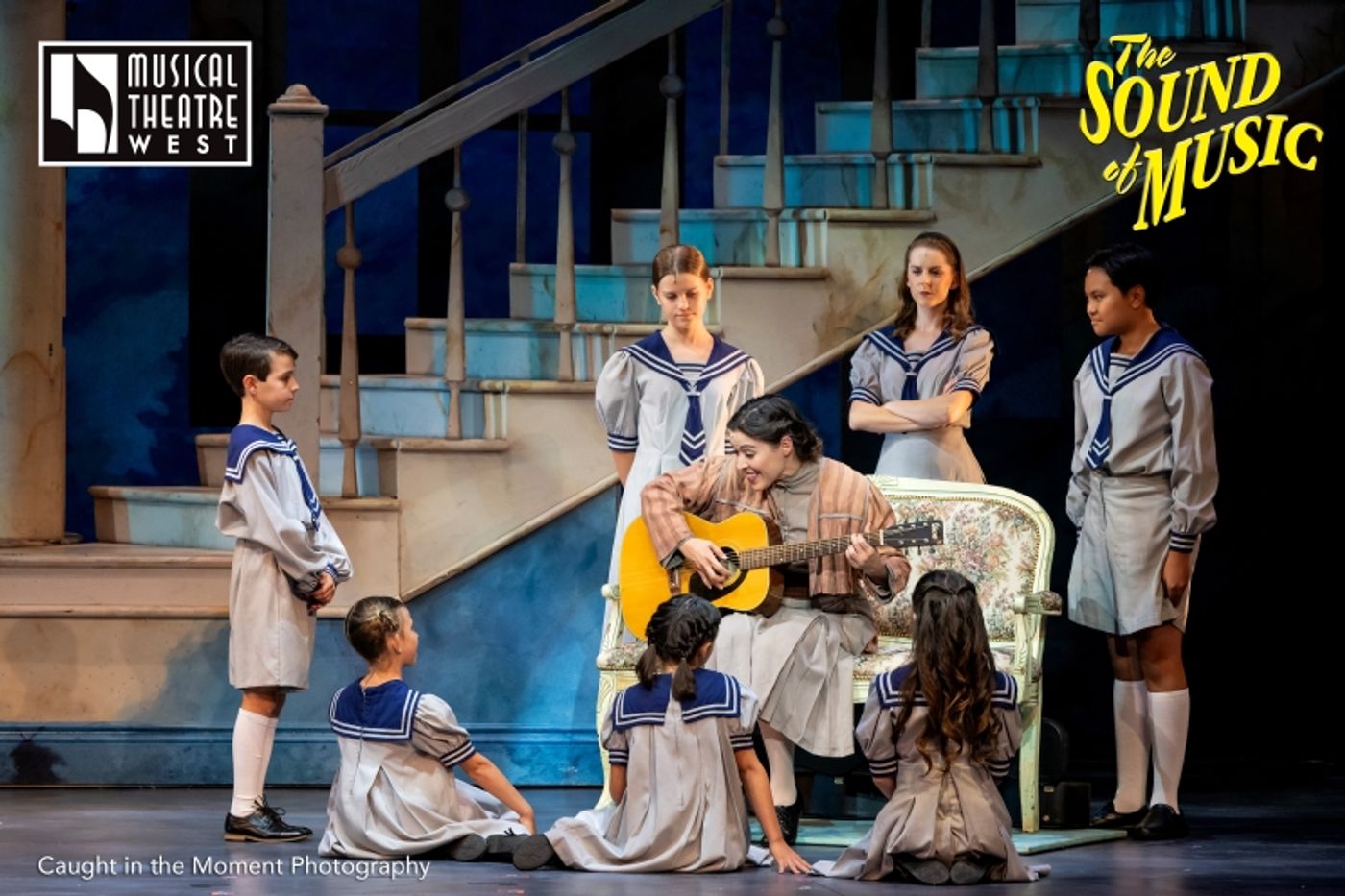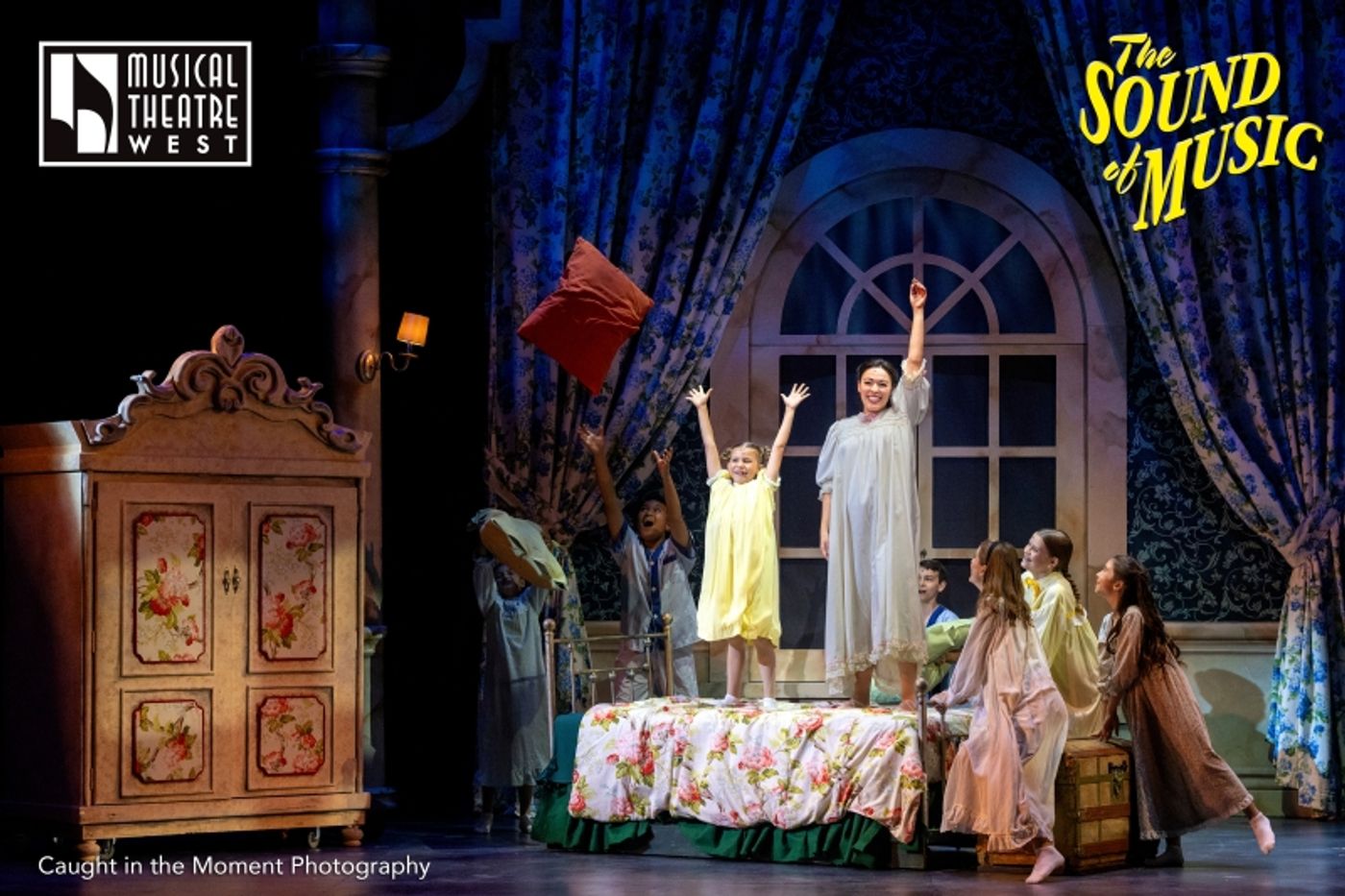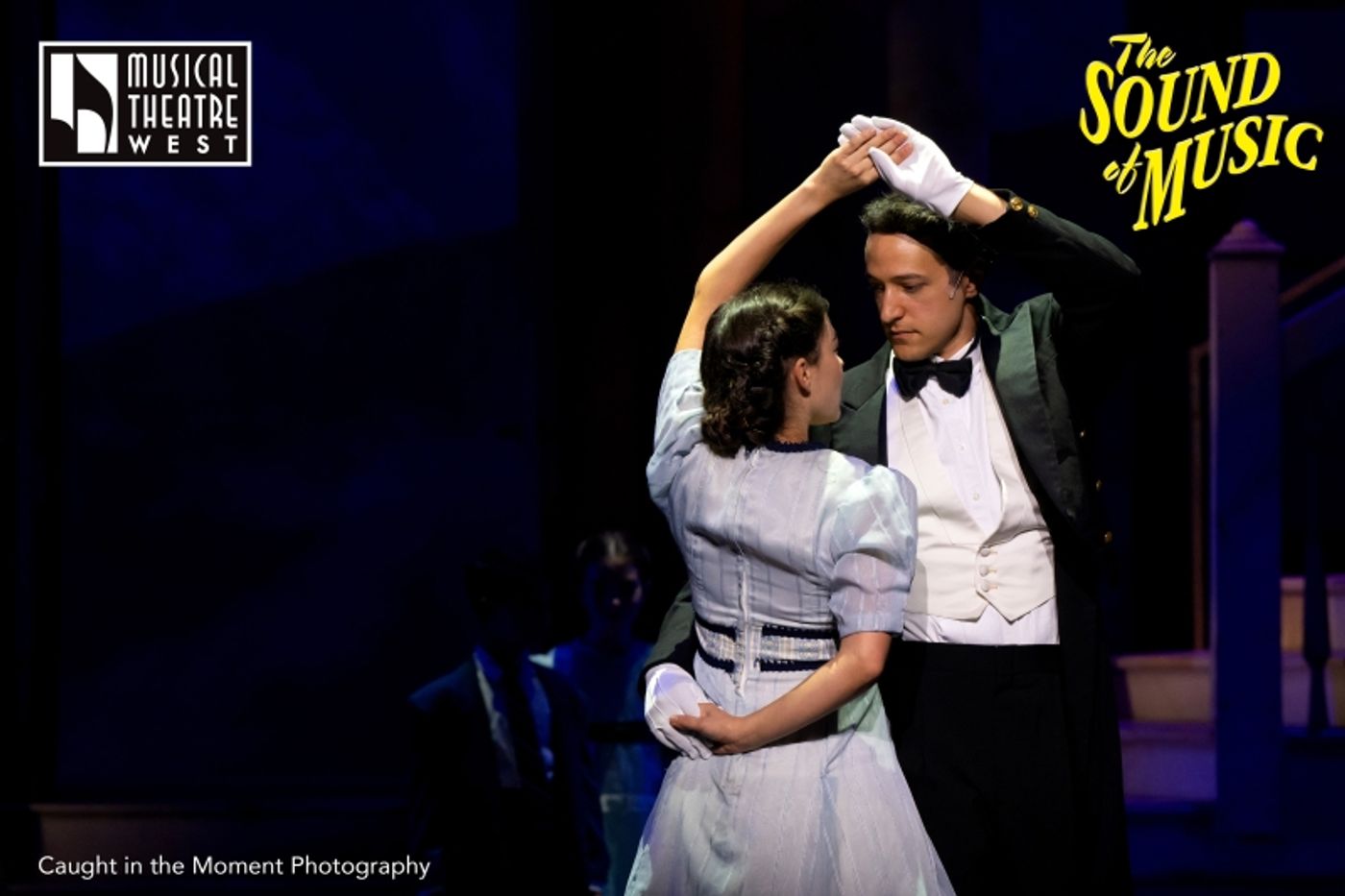Review: Musical Theatre West's Heartwarming THE SOUND OF MUSIC Blesses Long Beach
A very fine production of a very familiar musical, MTW's new revival sticks close to what makes the show a tried-and-true classic.

As someone who grew up with parents that celebrated the work of musical theater titans Richard Rodgers and Oscar Hammerstein II, it hasn't been a total surprise that I, too, eventually grew up into a life-long R&H fanboy. So for pretty much the entirety of watching Musical Theatre West's latest production of the Rodgers and Hammerstein 1959 classic THE SOUND OF MUSIC—now playing through November 5 at the Carpenter Performing Arts Center in Long Beach—I found myself smiling. A lot.
And I was not alone.
From the get-go, MTW's pleasantly perky production comes across as a show that's very eager to please, armed with a keen, fine-tuned goal of making sure both fans and newbies are left feeling uplifted and happy, and, yes, smiling.
Even in 2023, I have to admit that there really is still plenty to love and adore about this renowned Tony Award-winning musical, as cheesy, dated, and square as some may deem it is. From its cutesy moments with seven adorable children, to the oh-so-inevitable romance that blossoms between the two main characters who, natch, begin as polar opposites, this lovely, endearing production definitely wants to reiterate the musical's timeless, undefiled qualities—by constantly proving throughout its runtime why this overwhelmingly beloved show (arguably R&H's most famous work) still can resonate today, even while keeping its machinations fairly traditional to how it has always existed.
Although modern, more discerning theatergoers today are likely clamoring only for the new, for the bold, for the impactful, or even for the things that are more in-tune with today's sensibilities, MTW's THE SOUND OF MUSIC offers unabashed old-fashioned, tried-and-true saccharine goodness wrapped in a still surprisingly thoughtful musical that also—dare I say—gives equal room for its ingrained wholesomeness to walk alongside much more serious dark overtones.
This marriage between hummable showtunes and topical, often controversial social issues is, of course, a constant, admirable trait found in most of the remarkably progressive-leaning mid-century musicals of Rodgers and Hammerstein.

But, unencumbered by any inklings to modernize—except perhaps in its sprinkled instances of appreciated color-blind casting (which could have gone even further)—MTW's fine production of THE SOUND OF MUSIC is, for the most part, a very classical-leaning, book musical treatment of a very familiar property, scarcely deviating from its well-known original source material (written by Howard Lindsay and Russel Crouse), which is itself loosely based on real people that really existed and that lived through similar events as depicted in the musical (in case you didn't know, yes, the von Trapp family did exist in real life, as accounted in Maria Augusta Trapp's book The Trapp Family Singers).
On the surface, this fresh production is clearly (and smartly) banking on its nostalgic properties and its wholesome, family-friendly theatrics, making the show—helmed with admirable efficiency by director Wayne Bryan and choreographed by Christine Negherbon—comfortably reminiscent of our already ingrained expectations, even if your only point of reference to the musical is not any of the stage versions, but rather the hit Oscar-winning 1965 big screen adaptation that starred Julie Andrews.
To that end, MTW's production employs a high-caliber visual presentation that eases audiences back to familiar surroundings.
Adam Koch's time-worn but effective set designs are wonderfully evocative of several past productions of the musical, from its blue-skied mountain backdrops to the colorfully ornate stained-glass church windows that represent Nonnberg Abbey. The grand staircase—the central focal point of the von Trapp mansion set (which, I admit, made me a little nervous at times when it shook as actors descended from it)—has an inescapable wow-luxe factor. Additionally, I also want to note the superb work of lighting designer Paul Black, whose lighting schemes here provided a great enhancement to several scenes.
Sound-wise, the production triumphs with its lush-sounding full orchestra, revitalizing the musical's often gorgeous multi-layer score, here under the baton of musical director Dennis Castelano—who not only conducted the talented musicians in the pit, but also the excellent, angelic-sounding chorus of nuns that were a frequent highlight whenever they stepped forward.
By recreating the sounds of a multiple-piece orchestra that were synonymous in the theater pits of those very early days of Broadway, MTW's audience is gifted the honor of hearing the composer's original sweeping musical intentions.

Photo by © Caught In The Moment Photography.
Thus, every song in the production sounds great and is performed well, from the playfulness of "Do-Re-Mi" and "The Lonely Goatherd," to the hypnotic splendor of "The Laendler" waltz and the title song. I am also glad that this production incorporates the two beautiful songs written specifically by Rodgers for the 1965 film: "I Have Confidence" (which for me feels unnecessarily truncated here) and "Something Good" (which for me feels oddly sped-up here rather than caressed).
Every lyric and every note harkens back to the very moments these songs first entered into our brains and burrowed themselves in there forever.
Naturally, you can't praise a production of THE SOUND OF MUSIC without mentioning its period costumes, particularly the ones worn by the von Trapp kids. My grin certainly got even bigger the minute the set for the governess's bedroom came down to reveal exaggerated floor-to-rafters curtains that have a very familiar, iconic floral pattern—foreshadowing what will eventually become the future "play clothes" that pop up in later scenes. I also loved the instant nostalgia provided by the nautical-inspired school uniforms worn by the children upon first meeting the show's leading lady.
And, of course, there's no question that the talented, admirable ensemble of actors assembled for this show contributes significantly to the show's enjoyability. They are all to be exalted for making the roles their own while also valiantly fighting off any unfair comparisons that audiences will likely make between their portrayals and the more infamous ones seen before on stage or in the movie (er, movies if you count the one that was broadcast on TV a few years ago).
As proud Austrian Georg von Trapp, the jaded, retired Navy Captain who falls in love with the help, Jonathan Von Mering makes for a dashing leading man (with a singing voice to match), who, by the way, despite looking younger than previous actors I've seen in this role, is still believably commanding and debonair. Also surprisingly young-looking for the role of the Reverend Mother Abbess is the nonetheless vocally-superb Sarah Wolter, who possesses a palpable caring and nurturing disposition, who then later wows the audience with her inspiring rendition of "Climb Ev'ry Mountain" (hooray for that last money note!).
I also really loved the Senior nuns in Mother Abbess's periphery: the wonderful Cathy Newman who plays the ornery Sister Berthe (she also doubles later as Frau Schmidt, the von Trapp's harried but sympathetic housekeeper), Jacqueline Dennis as the smile-y Sister Margaretta, and Holly Santiago as the more agreeable Sister Sophia. The three nuns along with Wolter's Mother Abbess make "How Do You Solve A Problem Like Maria" a delightful early highlight.

Photo by © Caught In The Moment Photography.
Other standouts include Meghan Andrews as Georg's glamorous lady love Elsa Schraeder, who despite feeling tamer and less overtly conniving here than in other iterations, still steams like a boiling pot whenever that darn nanny enters the fray, which is quite fun to watch. Next to her, Brian Kim McCormick receives some well-earned chuckles for his less-effete, less-cartoonish take on lovable mooch Max Detweiler. Though both first-rate actors give applaudable turns in their respective roles, the two are still saddled with the show's pair of "throw-away" songs (correctly omitted from the film version), which they, thankfully, managed to make fairly interesting anyway.
I am also a fan of the beguiling duet/dance between the eldest von Trapp child, Leisl, played by the appealing Erin Dubreuil, and her future Nazi suitor Rolf Gruber, played by handsome heartthrob Brandon Keith Rogers. Their enchanting take on "Sixteen Going On Seventeen" fits perfectly within the canon of other excellent renditions of that memorable song that I have enjoyed in the past (to be honest, though, I miss the gazebo).
True evil, meanwhile, is represented well here via Damon Kirsche's appropriately cantankerous Herr Zeller, an effing Nazi petulantly hell-bent in getting Captain von Trapp to accept the incoming German regime… or else…
But, hands down the show's wonderful scene-stealers are the precious group of young thespians playing the younger von Trapp kids, which have been expectedly double-cast for the production. For the opening night performance, the audience was treated to the "Edelweiss Cast" which includes Brennan Esguerra as 14-year-old Friedrich; Rachel Beard as 13-year-old perpetual troublemaker Louisa; the adorably pint-sized Niles Gray as 11-year-old Kurt, Bellamie Soleil Smith as 10-year-old truth-spewing Brigitta, Lola Buckland as 7-year-old parasol fan Marta, and, finally, Blakely Amador as 5-year-old, always-listed-last Gretl. They are all adorable and they are all just impressively good, and they can even harmonize!
(The alternate "Do-Re-Mi Cast" of von Trapp kids consists of Josh Protzmann, Adrienne Amanda Morrow, Brady Barrett, Maisie Magdalen Oliveros, Abigail Barnaby, and Becca Last).
And, finally, this production has been blessed with the sound of Juliana Sloan, who gives the show a very proper ingenue persona to embody the lead role of the young, musically-inclined novitiate Maria—a portrayal that many will unfairly compare to the work of more, ahem, famous actors that have donned her wimple in the past. But Sloan, thankfully, does a great job with the role, equipped with a lovely Soprano and a cheery disposition that can believably charm both young, rambunctious tykes as well as a stubborn widower with a penchant for naval whistles. She is instantly likable and audiences will definitely root for her.
As comfortably reminiscent as this production is, I am pleasantly surprised that some scenes did somehow feel refreshed and new, despite probably having absolutely no changes to the text implemented. More than likely, I have had such an imbedded memory of this show over the decades that even subtle new infractions in cadence, song delivery, or blocking triggers a bit of curiosity. I feel like that's a good thing—especially for a show that looks and sounds the way one would expect to see it on a stage.
And yet even though many of us, including myself, are fairly familiar with THE SOUND OF MUSIC and the events it covers—and how it will eventually play out—I still found myself jolted during the climax of the second act, when three very large Nazi flags (indicating that the dreaded German Anschluss has arrived in Austria) are unfurled during the concert featuring the von Trapp family's final public singing performance.
The sight of those flags still feels like a walloping assault to the senses, reminding the audience of tragedies from the not-so-distant past that still reverberate today.
Perhaps because our own present world is, tragically, in similar severe pain at the moment, that I—along with a packed opening night audience—received the show as a gift of unfair, distanced privilege. Here, the Carpenter Center provided a kind of safe space to be able to welcome this brief pause/escape from the real-life geopolitical turmoil happening right now… only to revisit another turbulent moment in the historical past via the bubble of musical theater, where it so happens that we can experience a really lovely, well-done production of a show that many in the world have fond memories of from their childhood, despite the inclusion of a looming, dangerous threat intermingling with cheery music and a cutesy love story.
A part of me felt guilty in my privilege, while cities are exploding on the other side of the world. But, in a way, seeing MTW's THE SOUND OF MUSIC—a show that unapologetically acknowledges that real, evil exists in our world—is also a solid reminder for all who see it that love and compassion for our fellow humans can, ideally, somehow be a path to safety and salvation… and that we must do all we can to defy and stop tyranny when we see it coming in our actual sphere.
Follow this reviewer on Twitter / Instagram / Threads: @cre8iveMLQ.
Photos © Caught In The Moment Photography / Musical Theatre West.
---
Performances of Musical Theatre West's production of THE SOUND OF MUSIC continue through Sunday, November 5, 2023. The Carpenter Performing Arts Center is located at 6200 E. Atherton Street in Long Beach, CA. For tickets or for more information, please call 562-856-1999 x4 or visit online at www.musical.org.
Reader Reviews
Videos

